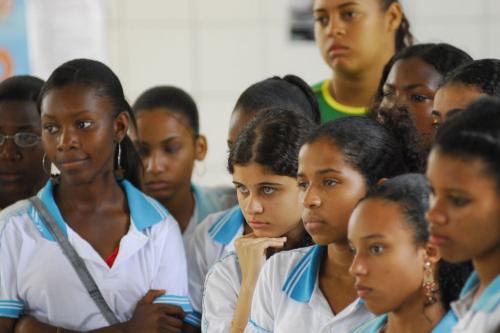Ahead of International Day, UN rights chief urges governments to target hate speech, crimes
On the eve of the International Day for the Elimination of Racial Discrimination, the United Nations human rights chief reminded Governments around the world that they have a legal obligation to stop hate speech and hate crimes, and called on people everywhere to “stand up for someone’s rights” on Mar 20.

Students watch a performance by their peers at Barros Barreto School, in Salvador, Brazil. The performance tackled social issues such as racism and gender discrimination.
“Politics of division and the rhetoric of intolerance are targeting racial, ethnic, linguistic and religious minorities, and migrants and refugees. Words of fear and loathing can, and do, have real consequences,” the UN High Commissioner for Human Rights, Zeid Ra’ad Al Hussein, said.
The UN High Commissioner’s statement comes ahead of the International Day for the Elimination of Racial Discrimination, marked annually on 21 March. The theme for this year is ending racial profiling and incitement to hatred, including as it relates to people’s attitudes and actions towards migration.
At the Summit for Refugees and Migrants in September 2016, UN Member States adopted a Declaration strongly condemning acts and manifestations of racism, racial discrimination, xenophobia and related intolerance.
The Summit also sparked the UN’s Together initiative to change negative perceptions and attitudes aimed at refugees and migrants.
In his statement, Mr. Zeid said that States do not have any excuse to allow racism and xenophobia to fester.
States “have the legal obligation to prohibit and eliminate racial discrimination, to guarantee the right of everyone, no matter their race, colour, national or ethnic origin, to equality before the law,” the senior UN official said.
He urged Governments to adopt legislation expressly prohibiting racist hate speech, including the dissemination of ideas based on racial superiority or hatred, incitement to racial discrimination, and threats or incitement to violence.
“It is not an attack on free speech or the silencing of controversial ideas or criticism, but a recognition that the right to freedom of expression carries with it special duties and responsibilities,” Mr. Zeid said.
To promote human rights, the UN High Commissioner’s office, known by its acronym OHCHR, is asking people around the world to , “Stand up for Someone’s Rights Today”. The campaign urges people to take practical steps in their own communities to take a stand for humanity.
Source:United Nations
- 323 reads
Human Rights
Ringing FOWPAL’s Peace Bell for the World:Nobel Peace Prize Laureates’ Visions and Actions

Protecting the World’s Cultural Diversity for a Sustainable Future

The Peace Bell Resonates at the 27th Eurasian Economic Summit

Declaration of World Day of the Power of Hope Endorsed by People in 158 Nations

Puppet Show I International Friendship Day 2020

